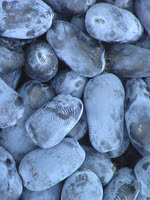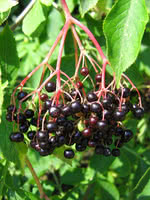Mon-Fri 9am - 5pm Mountain time
Indigo Treat Haskap (Honeyberry) vs Black Elderberry
Lonicera caerulea Indigo Treat
Sambucus canadensis
NOT AVAILABLE THIS SEASON - MIGHT RETURN
NOT AVAILABLE THIS SEASON - MIGHT RETURN
Indigo Treat has fruit similar in size and firmness to their Tundra variety, making it suitable for commercial production or your home garden.
Indigo Treat, like the Borealis Haskap, does not self-pollinate well. We recommend another variety, such as Honeybee or Berry Blue Honeyberry, be planted at a minimum 1:8 ratio with it to boost fruit production. Many experts suggest the highest Haskap yield comes from fields planted with the most varieties.
Due to stronger interest in newer cultivars, 2015 will be our last year selling Indigo Treat.
Black Elderberry is a deciduous shrub native to eastern North America. You can plant this shrub in moist areas and it will help stabilize your soil. You can also use it on rural properties anywhere you'd use a lilac.
Black Elderberries are considered to be partially self-pollinating. So while they will still produce some berries without cross-pollination, planting with another variety will increase yields. Consider planting with Ranch Elderberry or Bob Gordon Elderberry.
Warning: the seeds, stems, leaves, roots, and uncooked berries of the Black Elderberry are poisonous to humans when eaten in quantity. You should cook the berries to make them safe for human consumption.
Indigo Treat Haskap (Honeyberry) Quick Facts
Black Elderberry Quick Facts
Toxicity: leaves, stems, and uncooked berries are poisonous to humans

